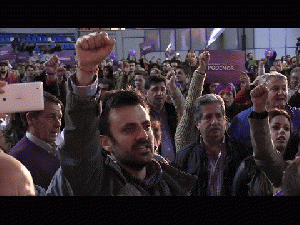Reprinted from Dispatches From The Edge
For the third time in a year, the tight-fisted, austerity policies of the European Union (EU) took a beating, as Spanish voters crushed their rightwing government and overturned four decades of two-party reign. Following in the footsteps of Greek and Portuguese voters earlier this year, Spaniards soundly rejected the economic formula of the Troika -- the European Central Bank, the European Commission and the International Monetary Fund -- that has impoverished millions of people and driven the jobless rate to almost a quarter of the country.
Greece's leftist prime minister, Alex Tsipras said "Austerity has been politically defeated in Spain," and that the election was a sign "that Europe was changing." Italy's prime minister, Matteo Renzi said, "As already happened in Greece and Portugal, governments which apply rigid austerity measures"are destined to lose their majorities."
The big loser in the Spanish elections was the rightwing Popular Party (PP) that lost 63 seats and its majority in the 350-member parliament. The PP won more votes than any other single party, but its support fell from 44 percent in the 2011 elections to 28.7 percent. While PP Prime Minister Mariano Rajoy ran on a platform that the Spanish economy had recovered from its disastrous plummet following the 2007-08 worldwide financial crisis, voters were not buying.
The economy is indeed growing -- 3.1 percent this year and projections for 2.7 percent in 2016 -- but after four years it has yet to reach pre-crisis levels. Unemployment has remained at 21 percent nationwide and more than double that figure among youth and in Spain's battered south.
Besides delivering a decisive "no" to austerity, Spaniards also turned out the two-party system that has dominated Spain since the death of dictator Francisco Franco in 1975. For 40 years the PP and Socialists Workers Party (PSOE) have taken turns running the country, racking up a track record of corruption and malfeasance. The Socialists also took a drubbing, albeit less so than the PP. PSOE lost 20 seats and fell from 28.8 percent support in 2011 to 22 percent in 2015.
The winners were two new parties, the left-wing Podemos ("We Can") and the center-right Ciudadanos (Citizens), although it was former that really won the day.
In pre-election polls the Citizens party was projected to become the second largest party, but voters clearly decided that its free market economic strategies and backward positions on abortion and immigration made it look like PP-lite. Ciudadanos was supposed to win upwards of 25 percent. Instead it took less than 14 percent of the vote, although that translates into 40 seats.
For months the Spanish and European media have been filled with stories on Podemos' falling support -- one newspaper called it "No Podemos" ("No we can't") -- and the New York Times essentially anointed Ciudadanos as the new up and comer. Voters had a different idea and gave the left party 20.6 percent of the vote and 69 seats in the parliament.
(Note: You can view every article as one long page if you sign up as an Advocate Member, or higher).






